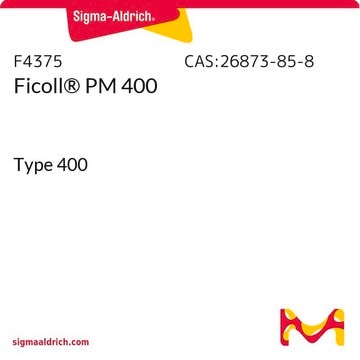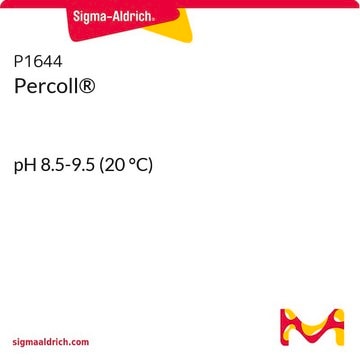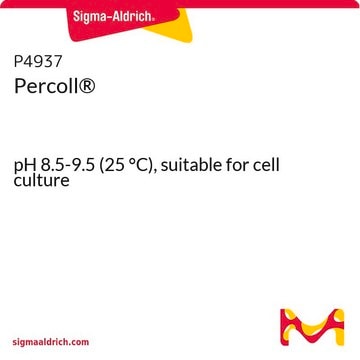1. Ficoll-Paque PREMIUM products - Sterile, ready-to-use density gradient media for the preparation of mononuclear cells - Based on Ficoll-Paque PLUS - Used for isolating high yields of mononuclear cells from bone marrow, peripheral blood, and cord blood
2. Regulatory Status - Neither Ficoll-Paque Plus nor Ficoll-Paque Premium products are approved for In Vitro Diagnostic Use - For clinical studies, a GMP grade product (Ficoll-Paque Premium) is preferred over a product produced under ISO 9001 - Both products are sterile and low in endotoxins
3. Differences between Ficoll and Histopaque - Ficoll and Histopaque are essentially the same formulation - Ficoll is a trademark name for polysucrose 400, and Paque is a trademark name for sodium diatrizoate - Both can be used to separate various cell types based on different densities and species
4.Cell Separation Using Ficoll and Histopaque - Different densities are used for different cell types and sometimes the same cell types, but from different species - Ficoll and Histopaque can be used to separate a variety of cell types based on different densities and species
F5415
Ficoll® solution
Type 400, 20% in H2O
Synonym(s):
Ready-to-use density gradient media
Select a Size
About This Item
Recommended Products
sterility
0.2 μm filtered
Quality Level
type
Type 400
form
liquid
concentration
20% in H2O
technique(s)
titration: suitable
color
clear colorless
solubility
water: soluble
density
1.055-1.075 g/mL
application(s)
hematology
histology
storage temp.
2-8°C
General description
Application
Other Notes
Legal Information
Storage Class Code
12 - Non Combustible Liquids
WGK
WGK 3
Flash Point(F)
Not applicable
Flash Point(C)
Not applicable
Choose from one of the most recent versions:
Certificates of Analysis (COA)
Don't see the Right Version?
If you require a particular version, you can look up a specific certificate by the Lot or Batch number.
Already Own This Product?
Find documentation for the products that you have recently purchased in the Document Library.
Customers Also Viewed
Protocols
Hematopoietic stem cell culture protocols for isolation, expansion, and differentiation of CD34+ cells including CFU assays.
-
What are the differences between Ficoll, Ficoll Paque Plus, Ficoll Paque Premium, Histopaque and the different products with different densities?
1 answer-
Helpful?
-
-
What is the difference between Product F5415, Ficoll® solution 20%, and the polysucrose type 400 used in the Histopaque 1077-1?
1 answer-
Ficoll is a registered trademark. The trademark was formerly held by Pharmacia, but today Amersham Biosciences/GE Healthcare hold the trademark. Since Sigma Aldrich uses polysucrose type 400 in the preparation of the various Histopaque products, the name polysucrose 400 is utilized.
Helpful?
-
-
Is Product F5415, Ficoll® solution 20% suitable for the separation of mononuclear cells without further dilution?
1 answer-
No. The 20% solution of Ficoll has a density of approximately 1.066 to 1.068 g/mL. Typically products such as Histopaque 1077-1 or Ficoll Paque have a density of approximately 1.076 to 1.078 g/mL. Such ready to use solutions are also osmotically balanced by the addition of a lower molecular weight chemical. Properly balanced solutions will typically have an osmolality in the range of approximately 280-300 mOsm/Kg. If a ready made product is required for the separation of mononuclear cells, products Histopaque 1077-1 or H8889 should be utilized.
Helpful?
-
-
Can more Ficoll be added to Product F5415, Ficoll® solution 20%, to increase the density to 1.077 g/mL?
1 answer-
This is not recommended. Ficoll has a molecular weight in the range of 400,000. Even 20% solutions of such high molecular weight products have extremely low osmolality. Without the addition of other lower molecular weight chemical, solutions of 20%+ of Ficoll are considered extremely hypotonic. Cells exposed to hypotonic solutions would not maintain viability and are prone to bursting.
Helpful?
-
-
Is Product F5415, Ficoll® solution 20%, sterile?
1 answer-
No claims are made for sterility for F5415. If a sterile product is required for cell culture use, product F8636 has been gamma irradiated and is considered a sterile product. Product F8636 is a powder and does not come as a sterile solution.
Helpful?
-
-
Is there a Product Information Sheet for Product F5415, Ficoll® solution 20%?
1 answer-
No. However there is a Product Information Sheet for product F4375. This product information sheet gives general information regarding Ficoll and possible uses. If mononuclear cells are to be separated, a better choice of products is Histopaque 1077-1, H8889 or one of the prefilled Accuspin tubes.
Helpful?
-
-
What is the Department of Transportation shipping information for this product?
1 answer-
Transportation information can be found in Section 14 of the product's (M)SDS.To access the shipping information for this material, use the link on the product detail page for the product.
Helpful?
-
Active Filters
Our team of scientists has experience in all areas of research including Life Science, Material Science, Chemical Synthesis, Chromatography, Analytical and many others.
Contact Technical Service















